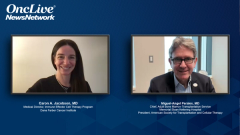
Sequencing With CAR T-Cell Therapy for LBCL
Caron A. Jacobson, MD, and Miguel-Angel Perales, MD, share considerations for sequencing CAR T-cell therapies in patients with LBCL, depending on treatments they have already received.
Episodes in this series

Dr. Jacobson and Dr. Perales discuss the impact of recently approved therapies, such as CD20 bispecifics like epcoritamab and glofitamab, on the sequencing of CAR T-cell therapy for relapsed and refractory large B-cell lymphoma. Despite the eligibility of many patients for CAR T-cell therapy, only about half of them are actually receiving it due to various factors, including referral patterns, patient preferences, insurance issues, and socioeconomic barriers.
The introduction of new therapies that are easier to administer in the community setting may further exacerbate this issue, as patients may receive these treatments before being referred for CAR T-cell therapy. While data shows that bispecifics can work after CAR T-cell failure, the efficacy of CAR T-cells in patients who have progressed after bispecific therapy remains unclear.
Dr. Jacobson emphasizes that CAR T-cell therapy has the potential to cure a percentage of patients with relapsed or refractory large B-cell lymphoma, serving as a definitive treatment. In contrast, the long-term efficacy of bispecifics is still uncertain due to limited follow-up data. Randomized studies in second-line therapy have shown that delaying CAR T-cell treatment until the third line can result in reduced complete response rates, durability of response, and survival.
Although new therapies can be administered in the community setting, this may come at the expense of the survival advantage offered by CAR T-cell therapy when given in earlier lines of treatment. This discussion highlights the importance of considering the use of CAR T-cells in the second-line setting for patients with relapsed or refractory large B-cell lymphoma.
Transcript summary generated by Claude AI.





































